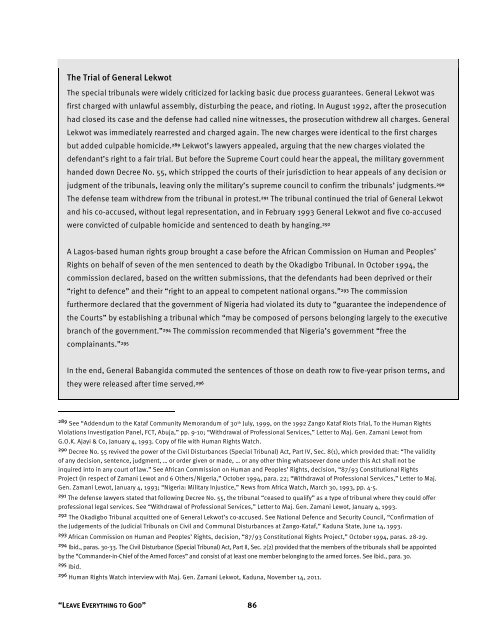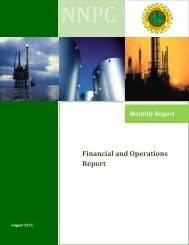Create successful ePaper yourself
Turn your PDF publications into a flip-book with our unique Google optimized e-Paper software.
The Trial of General Lekwot<br />
The special tribunals were widely criticized for lacking basic due process guarantees. General Lekwot was<br />
first charged with unlawful assembly, disturbing the peace, and rioting. In August 1992, after the prosecution<br />
had closed its case and the defense had called nine witnesses, the prosecution withdrew all charges. General<br />
Lekwot was immediately rearrested and charged again. The new charges were identical to the first charges<br />
but added culpable homicide. 289 Lekwot’s lawyers appealed, arguing that the new charges violated the<br />
defendant’s right to a fair trial. But before the Supreme Court could hear the appeal, the military government<br />
handed down Decree No. 55, which stripped the courts of their jurisdiction to hear appeals of any decision or<br />
judgment of the tribunals, leaving only the military’s supreme council to confirm the tribunals’ judgments. 290<br />
The defense team withdrew from the tribunal in protest. 291 The tribunal continued the trial of General Lekwot<br />
and his co-accused, without legal representation, and in February 1993 General Lekwot and five co-accused<br />
were convicted of culpable homicide and sentenced to death by hanging. 292<br />
A Lagos-based human rights group brought a case before the African Commission on Human and Peoples’<br />
Rights on behalf of seven of the men sentenced to death by the Okadigbo Tribunal. In October 1994, the<br />
commission declared, based on the written submissions, that the defendants had been deprived or their<br />
“right to defence” and their “right to an appeal to competent national organs.” 293 The commission<br />
furthermore declared that the government of Nigeria had violated its duty to “guarantee the independence of<br />
the Courts” by establishing a tribunal which “may be composed of persons belonging largely to the executive<br />
branch of the government.” 294 The commission recommended that Nigeria’s government “free the<br />
complainants.” 295<br />
In the end, General Babangida commuted the sentences of those on death row to five-year prison terms, and<br />
they were released after time served. 296<br />
289 See “Addendum to the Kataf Community Memorandum of 30 th July, 1999, on the 1992 Zango Kataf Riots Trial, To the Human Rights<br />
Violations Investigation Panel, FCT, Abuja,” pp. 9-10; “Withdrawal of Professional Services,” Letter to Maj. Gen. Zamani Lewot from<br />
G.O.K. Ajayi & Co, January 4, 1993. Copy of file with Human Rights Watch.<br />
290 Decree No. 55 revived the power of the Civil Disturbances (Special Tribunal) Act, Part IV, Sec. 8(1), which provided that: “The validity<br />
of any decision, sentence, judgment, … or order given or made, … or any other thing whatsoever done under this Act shall not be<br />
inquired into in any court of law.” See African Commission on Human and Peoples’ Rights, decision, “87/93 Constitutional Rights<br />
Project (in respect of Zamani Lewot and 6 Others/Nigeria,” October 1994, para. 22; “Withdrawal of Professional Services,” Letter to Maj.<br />
Gen. Zamani Lewot, January 4, 1993; “Nigeria: Military Injustice,” News from Africa Watch, March 30, 1993, pp. 4-5.<br />
291 The defense lawyers stated that following Decree No. 55, the tribunal “ceased to qualify” as a type of tribunal where they could offer<br />
professional legal services. See “Withdrawal of Professional Services,” Letter to Maj. Gen. Zamani Lewot, January 4, 1993.<br />
292 The Okadigbo Tribunal acquitted one of General Lekwot’s co-accused. See National Defence and Security Council, “Confirmation of<br />
the Judgements of the Judicial Tribunals on Civil and Communal Disturbances at Zango-Kataf,” Kaduna State, June 14, 1993.<br />
293 African Commission on Human and Peoples’ Rights, decision, “87/93 Constitutional Rights Project,” October 1994, paras. 28-29.<br />
294 Ibid., paras. 30-33. The Civil Disturbance (Special Tribunal) Act, Part II, Sec. 2(2) provided that the members of the tribunals shall be appointed<br />
by the “Commander-in-Chief of the Armed Forces” and consist of at least one member belonging to the armed forces. See ibid., para. 30.<br />
295 Ibid.<br />
296 Human Rights Watch interview with Maj. Gen. Zamani Lekwot, Kaduna, November 14, 2011.<br />
“LEAVE EVERYTHING TO GOD” 86




